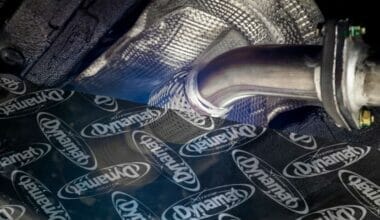How to tell if a fan clutch is failing? What are the symptoms of a failing fan clutch? And what will a new fan clutch cost? We answer these questions and more in this article. This article will provide you with the information you need to determine whether your fan clutch is failing or not. If you hear a clunking noise, this could be a warning sign that your fan clutch needs to be replaced.

Sound of a clunking fan clutch
When you notice that your engine’s fan is clunking, it could be a sign of a failing fan clutch. You can quickly diagnose the problem by opening the hood and listening to the fan. If the fan seems to be spinning freely, but you cannot hear any resistance when you spin it by hand, the clutch may be failing. Then, take your car to a mechanic for a proper diagnosis.
The noise can be caused by various things, but the most common is a faulty fan clutch. The fan clutch is connected to the engine through a viscous clutch, which can vary in engagement level. The RPM of the engine determines the fan’s speed, but the air conditioning can also affect its speed. Therefore, it is important to determine the exact cause of the noise and replace it as soon as possible.
Sometimes, the noise is not caused by the fan clutch, but by a failing belt or water pump. In this case, you’ll need to replace the fan clutch. Make sure you use a 1-7/8″ wrench. If you don’t have one, an adjustable wrench will do. Look for a wrench that has a square hole on the handle for ratchet attachment. Once the fan clutch is removed, it’s a straightforward process.
Symptoms of a failing fan clutch
While your car shouldn’t be giving you any stress while driving, it can be a big problem if your fan clutch fails. It won’t necessarily cause an overheating problem, but it will definitely decrease your gas mileage and power. If you notice excessive noise or fan spin, you should investigate further. A failing fan clutch may also be the cause of a code that indicates that the fan speed sensor circuit is faulty.
A fan clutch contains a small reservoir of silicone-based oil that flows into the main chamber as engine temperatures change. This oil disengages the clutch when engine temperatures increase or decrease. Traces of oil are perfectly normal and are not a sign that the clutch is failing. If your fan clutch is still generating noise, you should consider upgrading it to a thermal one. Check engine temperatures regularly as they should be below 99 degrees Celsius and 210 degrees F.
Another symptom of a failing fan clutch is an overheated engine. A properly functioning fan clutch dissipates excess heat through the radiator when the vehicle is moving. When the engine is stopped, there is no air flowing through the radiator, so the engine can’t dissipate its excess heat. In such a case, it’s important to have a professional check the clutch.
Cost of a new fan clutch
One of the most frustrating sounds in a vehicle is a grinding noise from the fan clutch. In addition to making the engine roar, a bad fan clutch can reduce the engine’s efficiency and performance. When it gets stuck, the fan will not engage, resulting in higher pressure and drag, which will reduce power and acceleration. Additionally, the clutch can break down, leading to decreased fuel efficiency and a significant decrease in miles per gallon.
To diagnose the problem, you must remove the fan shroud from the car. The procedure may vary for different models, so make sure to research the specific instructions for your car model. After removing the fan shroud, the mechanic will remove the broken fan and replace it with a new one. The mechanic will test the new fan and check for other problems that could be the cause of the noise. If the noise continues, the mechanic will need to check other parts of the engine, including the air filter.
A fan clutch replacement on a 2011 or 2012 Chevrolet Corvette will cost between $385 and $425. A 2005 Buick LaCrosse will cost between $550 and $660. While these prices may seem low, these are still very expensive repairs that could seriously impact your car’s performance. Fortunately, there are cheaper ways to solve your noisy fan problem. Instead of spending hundreds of dollars on a new fan clutch, you can save money by doing it yourself.
